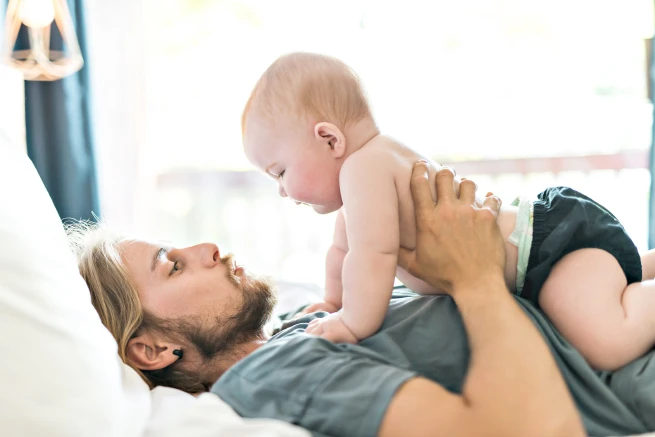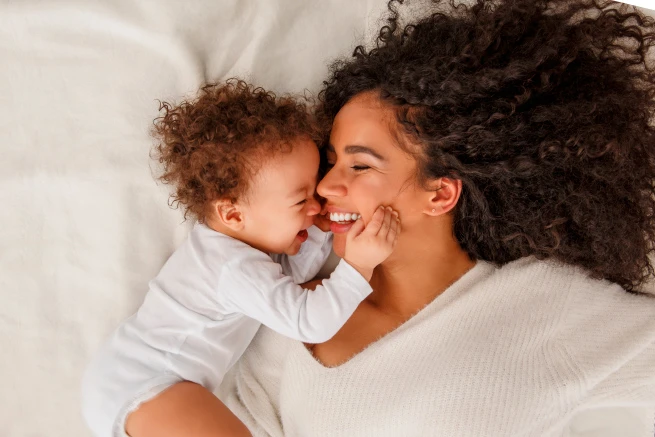Symptoms of measles in a child
When measles begins, you might see the following symptoms of measles in your child:
Runny or blocked nose and sneezing
Their eyes are red and may be sensitive to light
Watery eyes, swollen eyelids
Greyish white spots in their mouth and throat
Loss of appetite
Tiredness, low energy levels
It's important to contact your GP right away if you suspect that your child has symptoms of measles, so they can confirm (or rule out) that’s the case.
After a few days, look out for:
A blotchy rash of brownish-red spots, or slightly raised spots that may be joined together, usually appearing on the head or neck
The rash spreading over their whole body
The rash can be itchy for some children
How long do measles in children last?
For most children, the illness normally lasts around 7-10 days.
Measles can be spread quite easily. Children are most contagious when they have signs of measles such as fevers, runny nose, and a cough, as measles can pass through droplets in the air. It's best to keep them out of school or nursery for at least four days from the appearance of the rash.
When to call the doctor about measles in children
Measles is highly infectious, so it’s easy for the infection to spread to other people quickly if they haven’t been vaccinated. For this reason, if you think your child has symptoms of measles, you should contact your GP as soon as possible.
It is also important to monitor your child to see if they have any other symptoms which could indicate there is a more serious issue developing. These symptoms include shortness of breath, chest pain, coughing up blood, fits (convulsions), confusion or drowsiness.
For more information on measles complications, visit https://www.nhs.uk/conditions/measles/complications/.
Treatments for babies and children
As a parent, it’s only natural to be worried if your child has measles. Although there’s no specific treatment for measles, it usually clears up after 7 to 10 days.
There are lots of things you can do to help your little one. GPs will recommend resting at home until your child is feeling better.
Do they have a fever?
Measles symptoms in children can include feeling feverish, so you may want to keep an eye on their temperature.
Are they suffering from aches and pains, too?
Aches and pains can make it hard for your little one to settle and get the rest they need. Here are some options that can help relieve these symptoms:
Paracetamol or ibuprofen can be used to reduce symptoms such as a high temperature (fever) and relieve any aches and pains if your child is uncomfortable.
Try a paracetamol-based medicine for pain and fever relief like CALPOL® Infant Suspension. It’s suitable for babies over 2 months, weighing over 4kg and not premature.
Are they 6 years or older? You could try a paracetamol-based medicine for older children, like CALPOL® SIXPLUS™ Suspension.
Alternatively, you can try an ibuprofen-based medicine, like CALPROFEN® Ibuprofen suspension, which can be given to children over 3 months and weighing over 5kg, for pain and fever relief. It starts to work on fever in just 15 minutes and keeps on working for up to 8 hours.
Are they suffering from cold-like symptoms?
If your child is experiencing cold-like symptoms such as a cough or runny nose, try to create an environment which has a lot of moisture. This can be done by sitting in a hot, steamy bathroom. Typical cold remedies such as warm honey and lemon can also be used to treat a cough, but honey should not be given to children until they are over 1.
3 Handy tips for looking after your little one when they have measles
Measles can make your little one feel very sensitive to the light, so try closing their curtains or turning lights down low.
You might find your child has crustiness around their eyes. Use damp cotton wool to wipe it away, wiping from the inner to the outer eyelid. Use a new piece of cotton wool with each wipe.
Make sure your child drinks plenty of water. Offer them lots of drinks to keep them hydrated.

Corona Virus
It can be hard to know what to do if your child is unwell. It's important to trust your instincts and get medical help if you need it. If you think your child may be suffering from COVID-19 symptoms, visit the NHS website for further information.



